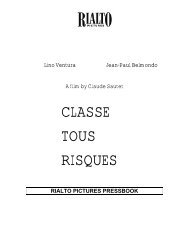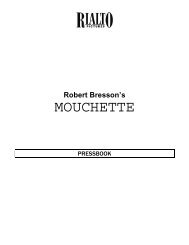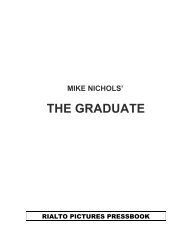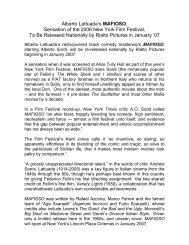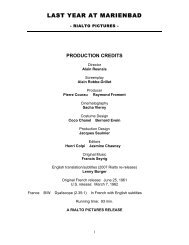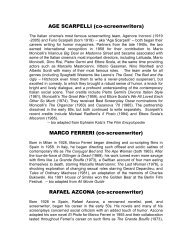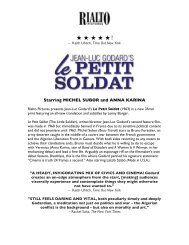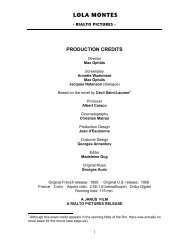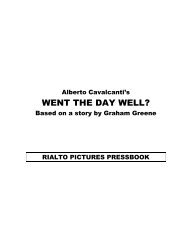download the Maculine Feminine Pressbook - Rialto Pictures
download the Maculine Feminine Pressbook - Rialto Pictures
download the Maculine Feminine Pressbook - Rialto Pictures
Create successful ePaper yourself
Turn your PDF publications into a flip-book with our unique Google optimized e-Paper software.
Have you had any reactions to your film from young people, outside of<br />
those who have worked in it?<br />
No. Since <strong>the</strong> film is prohibited to people under eighteen, I have no idea whe<strong>the</strong>r it<br />
interests <strong>the</strong>m. I think <strong>the</strong>re should be a good twenty films like it, from different<br />
backgrounds – in <strong>the</strong> provinces, in <strong>the</strong> North, in <strong>the</strong> South. Films that television<br />
ought to do but doesn’t, because television only fills up a schedule. Which are<br />
often hours well spent, but are not genuine works. They don’t think like painters or<br />
novelists; <strong>the</strong>y forget works of imagination. And works of imagination are<br />
none<strong>the</strong>less what lie closest to people’s hearts.<br />
I believe that if young people could see it – young people <strong>the</strong> same age as<br />
Léaud – <strong>the</strong> film would go on in <strong>the</strong>ir heads after <strong>the</strong> movie had ended.<br />
The three or four young people who played in it could have experienced what went<br />
on in <strong>the</strong> film ra<strong>the</strong>r than something else. There is no difference between what <strong>the</strong>y<br />
did during <strong>the</strong> day and what <strong>the</strong>y represented in <strong>the</strong> film; it was exactly <strong>the</strong> same.<br />
You disturb <strong>the</strong> traditional relationship between <strong>the</strong> director and his actors.<br />
I’m sure of one thing, that this is what cinema means to me, and that this is what it<br />
has never been; it went off track immediately. When Lumière first invented cinema,<br />
<strong>the</strong> last thing he had in mind was a spectacle. One day a guy said to him, “Come<br />
show your gimmick in my neighborhood and we’ll make people pay.” But Lumière<br />
was an artist, not a showman. I know very well that cinema is a sort of industry,<br />
one that’s got to make a profit and that’s part show business. But in my work<br />
<strong>the</strong>re’s always a part that’s not a show at all and yet it comes through quite nicely,<br />
like an informal lecture, or a course at <strong>the</strong> Sorbonne, or a concert. The <strong>the</strong>ater is<br />
pure show; it’s magnificent. Cinema – a film by Jacques Demy or [Max Ophuls’]<br />
Lola Montes – can be pure spectacle. O<strong>the</strong>r films are both, and still o<strong>the</strong>rs that<br />
have absolutely nothing to do with this. They can be bad – that’s ano<strong>the</strong>r question<br />
entirely – but <strong>the</strong>y’re searching for something.<br />
Do you think cinema as an art is in good health?<br />
From <strong>the</strong> point of view of images and sound alone, I think cinema is in better<br />
health than ever. People need it, above all in France where <strong>the</strong> population is<br />
getting younger. It’s young people who go to <strong>the</strong> movies, and <strong>the</strong>y haven’t found<br />
<strong>the</strong>ir films, <strong>the</strong>ir television shows. They’ve found <strong>the</strong>ir music, but <strong>the</strong>y haven’t really<br />
found <strong>the</strong> image that goes with it.<br />
14



